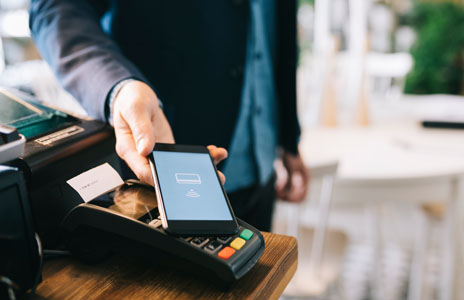As individuals and businesses constantly find ways to expand the opportunities available online, commerce and shopping become increasingly prominent in the cyberspace. Having a computer or handheld device means that individuals are enabled with the capability to purchase or sell goods and services online. This increase in technological capability not only streamlines commerce,but allows almost instant accessibility to help and support services when needed. Ecommerce components include mobile banking, online shopping, and mobile wallet services.
Mobile Banking
Mobile banking is available through cell phone apps as well as mobile bank websites. Typically, mobile banking includes the ability to check account balances, reach customer support, open new accounts, transfer funds, and more. By allowing customers to engage in such practices online, trips to a physical financial institution are less frequent. Not only do banks allow ease of use within apps, they also include important security features, such as the ability to lock a misplaced or stolen card with the swipe of a finger. This can be especially useful in situations where one loses their card but is not sure whether it was stolen or simply misplaced. If the card is found again, it can be unlocked just as swiftly as it was locked, however, if the card is unable to be found, the individual is able to keep the card locked until a replacement can be secured. Mobile banking apps are all password protected, and individuals are able to opt for fingerprint protection as weak, ensuring that funds are safe.
Mobile Wallet Services
Mobile wallet services are services such as Apple Pay and Google Wallet, allow individuals to make purchases in-store without the presence of a physical card. Users are required to enter card information on their phone, enabling them to make wireless transactions on-site. This can be quite beneficial because of the added encryption services with digital wallet payments. According to Apple, when you add a card to the wallet, “Apple decrypts the data, determines your card’s payment network, and re-encrypts the data with a key that only your payment network (or any providers authorized by your card issuer for provisioning and token services) can unlock.” Basically, once a card is added, its information is only available to the card issuer. There are additional security measures set in place at the time of purchase, such as a “transaction-specific” dynamic security code which allows the information used in one transaction to be specific only to that transaction, eliminating the possibility to replicate and use the information for fraudulent activities. This feature makes digital wallets more effective in safety than the standard magnetic stripe.
Effective Marketing
Ecommerce is successful on the premise that it affords individuals the ability to shop from wherever they may be, unlike regular shopping. Companies are able to capitalize and profit from online sales, because while physical store locations only operate within certain hours, websites can be accessed 24/7. “Online only” deals are a common tactic used by companies to generate a heightened number of online sales. Effective marketing strategies are especially important for companies who operate solely online. By launching engaging ad campaigns, brands are able maximize the reach and potential of using the internet. Another engaging strategy is to reward members with exclusive deals, rewarding them for loyalty. An example of this is how Amazon rewards Prime members with Prime Day, allowing them to access a variety of deals. By making customers feel involved in a way that is mutually beneficial, brands maximize the potential of commerce and the opportunities they have with it.






